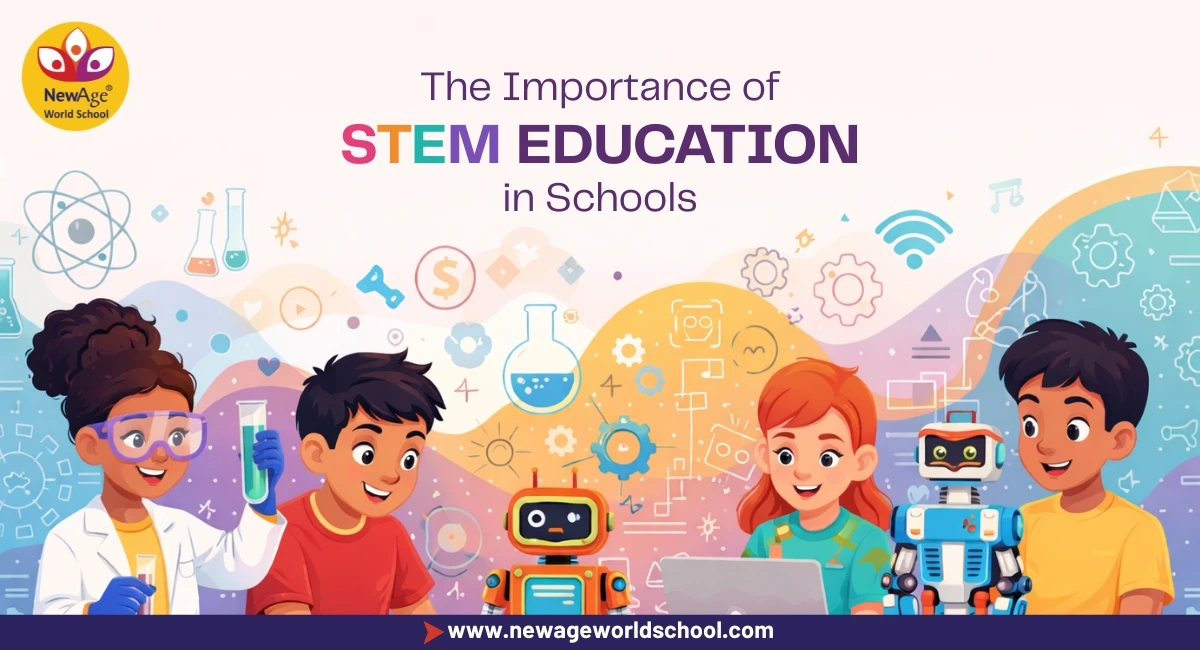The Crucial Role of Schools in Shaping a Child's Personality and Development

Table of content
Introduction
1. Academic Growth: A Foundation for Development
2. Character Building: Developing Good Human Beings
3. Social Skills: Learning to Interact with Others
4. Extracurricular Activities: A Holistic Approach to Development
5. Positive Learning Environment: The Backbone of Development
The Role of Teachers in Personality Development
Preparing Children for the Future
Conclusion
Introduction
Schools are no longer just places where children learn math or science; they play a vital role in shaping the overall personality development of children. From academics to social skills and from moral values to character building, schools are where children grow intellectually, emotionally, and socially. Today's school environment helps children become better individuals, preparing them for the future with skills and qualities that last a lifetime.
In this blog, we will explore how schools are instrumental in a child's development and why they are so much more than institutions for learning.
1. Academic Growth: A Foundation for Development
When we think of schools, academics often come first to mind, and for good reason. The foundation of academic potential in children is built within the classrooms. However, it is not just about memorizing facts or solving equations. Schools today focus on helping children get good marks by developing critical thinking, problem-solving, and creativity. The modern education system aims to push children to their limits, encouraging them to explore their potential in various subjects.
One important factor in academic growth is creating a personalized learning experience. Every child is unique; they learn and process information differently. The Best international schools in North Bangalore often offer individualized learning plans, which allow each student to learn at their own pace. This approach boosts academic performance and fosters confidence in children as they see themselves succeeding in their own way.
2. Character Building: Developing Good Human Beings
Beyond academic success, schools are essential for character-building in children. They are the first-place children learn about ethics, values, and proper behaviour. Schools teach children the importance of honesty, respect, and integrity. Learning to be fair and kind is as important as any academic lesson. These traits help children grow into responsible adults who contribute positively to society.
A good school environment makes students empathetic, ethical, and moral. For instance, raising your hand to ask questions or waiting for your turn teaches patience and discipline. These valuable life skills shape a child's personality from an early age.
Moreover, A school helps children prepare for the future by teaching them values like cooperation, empathy, and integrity, which are essential for personal and professional life. Schools encourage children to work in teams, respect their peers, and understand diverse perspectives.
If you are curious how schools support a child's personality development, check out this article on The Vital Role of Play in Child Development, where play is an essential tool for character and personality growth.
3. Social Skills: Learning to Interact with Others
Social interaction is a significant part of a child's development, and schools provide the perfect platform. Social skills development in children happens naturally as they interact with their peers, teachers, and staff. Schools teach children how to express themselves, resolve conflicts, and work in groups. Social skills cannot be learned from textbooks; they require real-world practice, and schools offer just that.
These interactions help kids come out of their shells, making them more confident in their communication and better equipped to face the outside world. Communicating effectively is crucial for both personal and professional success, and schools ensure that children are well-prepared in this aspect.
To dive deeper into how schools foster these skills, check out 10 Social Skills You Can Start Teaching Your Child Now for more insights on developing essential social competencies.
4. Extracurricular Activities: A Holistic Approach to Development
A well-rounded personality is built in more than just the classroom. Extracurricular activities for children play a major role in shaping who they become. Activities like sports, arts, drama, and music allow children to explore their talents, develop new skills, and build self-esteem. These activities also teach valuable life lessons like teamwork, leadership, and perseverance.
Engaging in extracurriculars can sometimes impact a child's personality more than academics alone. Participating in a school play or being part of the soccer team teaches children how to work with others, deal with challenges, and grow their leadership abilities.
To learn more about leadership development in schools, check out How to Develop Leadership Qualities in Children, which explores various ways schools encourage leadership in children.
Extracurriculars are a great way to balance children's personality development and academic growth. Schools encouraging these activities allow students to discover their potential beyond books and exams.
5. Positive Learning Environment: The Backbone of Development
All of this is only possible with a positive learning culture. The environment in which children learn plays a significant role in their overall development. A school must be a safe, welcoming space where children feel encouraged to express themselves, ask questions, and make mistakes. A positive atmosphere boosts not only academic growth but also emotional well-being.
Teachers and staff need to be supportive and nurturing, creating a space where children feel valued and understood. Schools that foster a positive culture help children develop resilience, confidence, and a love for learning.
Schools that focus on a child's personality development through such a nurturing environment often see students who are well-rounded, kind, and capable of facing life's challenges with a positive mindset. These values stay with them as they grow, making them better students and human beings.
The Role of Teachers in Personality Development
Teachers play a vital role in shaping a child's personality. They are not just educators but mentors, guides, and sometimes even role models. By understanding each student's strengths and weaknesses, teachers can provide support that fosters both academic potential in children and emotional growth.
A teacher's role goes beyond imparting knowledge. They must also instill values, encourage curiosity, and inspire creativity in children. When teachers connect with their students on a personal level, they help create an environment that encourages the personality development of children.
Preparing Children for the Future
In the end, the goal of any good school is to help children prepare for the future. This goes beyond academics. Schools teach children to face challenges, adapt to new situations, and remain resilient in adversity. These skills are just as important as academic knowledge when succeeding in life.
Conclusion
In conclusion, schools play an essential role in shaping the personality development of children. Schools provide children with the tools they need to succeed in life through academics, social skills, character-building, and extracurricular activities. The Best international schools in North Bangalore focus not just on helping the children get good marks but on creating individuals who are well-rounded, confident, and ready for the future.
By fostering a positive learning culture and providing opportunities for social skills development in children, schools ensure that children grow into empathetic, responsible, and capable adults.

















Leave a Reply
Your email address will not be published. Required fields are marked *
Comments
No comments available